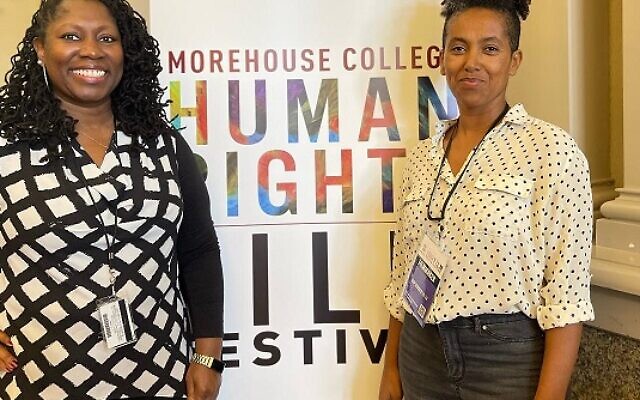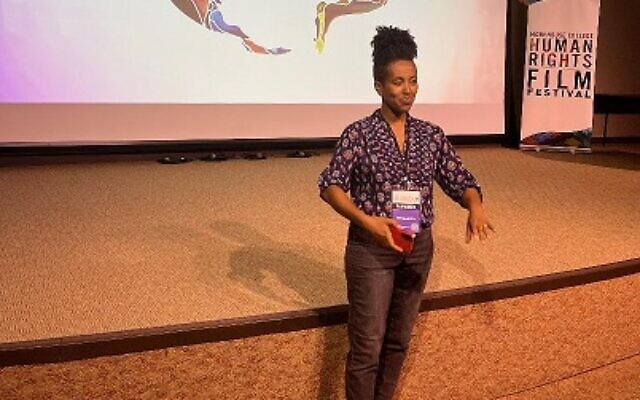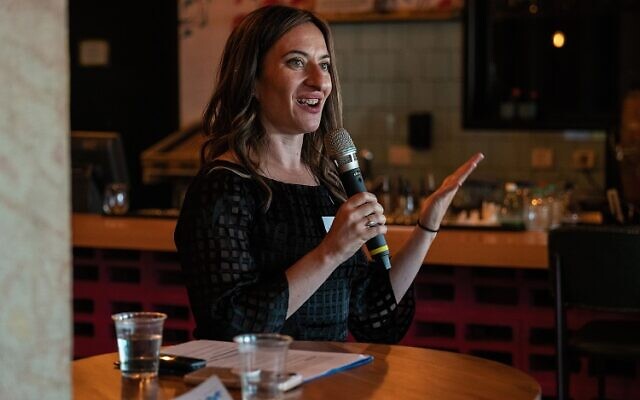Film Reveals Complex Story of Ethiopian Immigration
“With No Land,” detailing the mass migration of Ethiopian Jews to Israel during Operation Solomon, was screened at the Morehouse College Human Rights Film Festival.
In September, Atlanta’s Morehouse College was the site of a screening of an Israeli documentary that dealt with the historic airlift of 15,000 Ethiopian Jews to Israel in 1991. The film, “With No Land,” not only told of the miraculous 24-hour mission that set a world record for the most passengers on a single aircraft, but also related some of the difficulties faced by the Ethiopians before, during and after their immigration.
Ethiopian-born Israeli filmmaker Aalam-Warqe Davidian and her husband, Kobi Davidian, wrote and edited the 80-minute film which used archival footage and firsthand accounts of participants. In the film, they explored the desperation of the Ethiopian Jews and the North American activists who helped bring subsequent groups of Ethiopians to Israel.
Bringing the film to the Morehouse College Human Rights Festival “was a different angle for me,” said Aalam-Warqe Davidian. “I was curious to show the film to the black community here and to try to see what they would capture in the history. There’s a line about black immigrants and I wondered if they could understand the special situation of Ethiopian Jews.”
In fact, local community leader Lois Frank, who attended the screening, noted that during the question-and-answer session afterwards, one black young man stated that he never knew that Jewish Black Africans had come to Israel. He called it a “revelation.”
The film, said Frank, was “not all sweetness and light. Artists tend to be more critical.”

“With No Land,” so named because Jews don’t have the freedom to own land in Ethiopia, expands upon the long-told heroic story of what was called Operation Solomon, and relates the crisis that the Ethiopians experienced once in Israel. “There was a spiritual crisis,” Davidian said.
Aalam-Warqe Davidian was 11 years old when she immigrated to Israel. After living in Safed for a year, she attended a boarding school in Jerusalem, then high school near Tel Aviv. It was only after the army that she had an opportunity to work with a famous film director and decided to make movies. “I thought it was a good way to express myself, so I studied at the Sam Spiegel Film and Television School and graduated 10 years ago.”
“Most of my movies deal with mother/daughter issues and relationships within immigration stories,” she added.
Aalam-Warqe Davidian and her film were brought to the Morehouse Human Rights Film Festival by BAMAH Inc., a Washington, D.C.-based independent non-profit arts program that brings Israeli artists and culture to the U.S. The idea, said Flo Low, its founding executive director, is to “inspire and connect people” with Israel. Low, who lived in Israel for 11 years, said “It’s important to build relationships with different communities.”

Low called Aalam-Warqe Davidian a “visual filmmaker. She tells this historical story and experiences of the Ethiopian people and tells it with great artistry.” Some of the experiences are painful, she added, but powerful. “We wanted to give a broader platform for her work and wanted to bring these stories to Atlanta and across America. Storytelling has the power to generate empathy in a way that nothing else can. This film tells the story with all its complexities and allows us to get a more nuanced understanding” of the situation.
Low lauded the Consulate General of Israel in Atlanta which was one of the sponsors of the Human Rights Film Festival. In a statement, Consul General Anat Sultan-Dadon said, the consulate was proud to support the festival because “social justice and human rights are at the core of the State of Israel and our Jewish tradition, as is the value that Israel places on supporting artists and expression through cultural work.” Through the documentary, she added, Aalam-Warque Davidian “tells an important story that is a part of the story of the State of Israel and the diversity of the Jewish people.”
The five-day festival was held both in-person and virtually this year.
- News
- Local
- Jan Jaben-Eilon
- Morehouse College
- documentary
- Ethiopian Jews
- With No Land
- Aäläm-Wärqe Davidian
- Kobi Davidian
- Human Rights Festival
- Lois Frank
- Operation Solomon
- Safed
- tel aviv
- Sam Spiegel Film and Television School
- BAMAH Inc.
- Flo Low
- Consulate General of Israel
- Consul General Anat Sultan-Dadon




comments